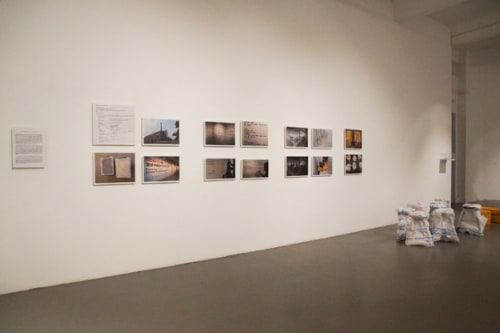Installation
Installation (photographs, essay, 2 boxes of sunflower seeds, 8 stools in various sizes)
On April 26, 2014, the Chinese Contemporary Art Award (CCAA) held a 15th anniversary exhibition at the Shanghai Power Station of Art to commemorate the award participants of the past 15 years. Uli Sigg, the former Swiss ambassador to China and a prominent collector of contemporary art, founded CCAA in 1997 as a platform to promote the Chinese contemporary art scene by attracting foreign interest and discussion of the Chinese cultural landscape. As Uli Sigg’s old friend and long time colleague, Ai Weiwei served as a CCAA jury member multiple times and was awarded the Lifetime Achievement Award in 2008. The historic anniversary exhibition was to include two works, Sunflower Seeds and Stools, by Ai Weiwei, who had been deeply involved with CCAA’s work and development. Shortly before the exhibition opened to the public, however, government officials forced the complete removal of Ai Weiwei’s works and name from the venue. The Shanghai Municipal Bureau of Culture barred the event organizers from showing or mentioning Ai Weiwei. Although the CCAA staff, the Shanghai Power Station of Art museum, and cultural officials attempted to negotiate, the event organizers ultimately had no choice but to obey, and his two works were removed from the exhibition space. His name was also removed from the wall where it was listed as the 2008 Lifetime Achievement Award winner. Although Uli Sigg announced his regret in his opening speech that one artist was not able to be included in the show, these comments were intentionally left untranslated. In the end, Ai Weiwei’s presence had almost completely disappeared from the Shanghai Power Station of Art. In response to this action, his two works, along with a series of photographs taken at the Shanghai exhibition, are now being shown outside the country. Because they were censored in the Shanghai show, these pieces now have an added history to them – neither was particularly inflammatory or controversial, but both were removed simply because of the Ai Weiwei’s name. This goes beyond censoring due to political content and makes showing artwork of any kind a definite risk in the world of contemporary Chinese art. The issues of censorship and political sensitivity are increasingly complicated, and increasingly placed in a global context. As China draws more foreign interest for large-scale art exhibitions, muting globally recognized artists like Ai Weiwei becomes an international focal point for government censorship issues.
